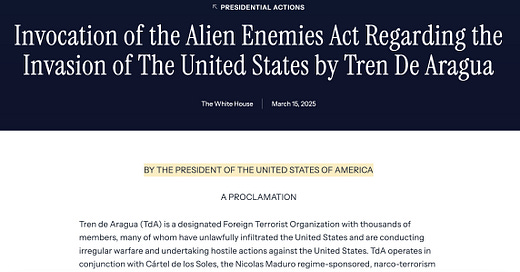In another twist from the Trump White House, President Donald Trump told reporters just now that he did not sign the controversial proclamation invoking the Alien Enemies Act, despite the document being listed on the official White House website as a "Presidential Action" and bearing the words: "BY THE PRESIDENT OF THE UNITED STATES OF AMERICA."
If you appreciate independent, no-nonsense reporting that cuts through the spin, consider becoming a paid subscriber. Your support helps me continue exposing the facts that mainstream media won’t.
Speaking to the press as he departed the White House, Trump dismissed responsibility for the order, stating, "I don't know when it was signed 'cause I didn't sign it. Other people handled it. But Marco Rubio's done a great job and he wanted them out and we go along with that."
Yet, just days earlier, the administration’s own Press Secretary Karoline Leavitt told an entirely different story from the briefing room podium. In response to a question about the controversial deportation of alleged members of Tren de Aragua, a Venezuelan gang labeled by the administration as a “foreign terrorist organization,” Leavitt was crystal clear:
"President Trump signed a proclamation invoking the Alien Enemies Act regarding the invasion of the United States by the foreign terrorist organization Tren de Aragua. At @POTUS' direction, @DHSgov carried out a counterterrorism operation deporting nearly 200 violent TDA terrorists, which will save countless American lives."
So which is it?
The contradiction might seem like a typical Trump-era communications breakdown—but it may have deeper legal consequences. It appears as though the administration is growing increasingly concerned that top DHS officials could be held in contempt of court for violating Judge James Boasberg’s recent ruling on the Alien Enemies Act.
Invoking the Alien Enemies Act—a law dating back to 1798 and rarely used in modern times—may have been a desperate workaround. But if Trump now claims he didn't sign the proclamation, does that mean it's invalid?
It's a question laced with irony. This week, Trump launched a full-throated attack on President Joe Biden for using an autopen to sign documents, particularly presidential pardons. Trump insisted that such measures rendered Biden's actions illegitimate and unconstitutional.
So if Trump didn't personally sign this proclamation—as he now says—does it meet his own standard for a valid presidential act? Or is this just another case of Trump attempting to shift blame when legal accountability looms?
There are broader implications, too. Deporting nearly 200 individuals under the authority of a proclamation the president claims he didn’t sign could expose DHS and other agencies to legal challenges, especially if it’s revealed the document was executed without a clear chain of legal authority. That’s likely untrue, however. The Federal Register clearly shows Trump’s signature on the document. The signature is valid and executed. As a result, it’s more likely that Trump is just trying to shift blame.
In the court of public opinion, the inconsistency raises yet another red flag about the chaotic and opaque nature of Trump’s second-term governance. Either he lied to the public today, or his administration misrepresented his actions.
In either case, the president’s credibility, and the legality of a sweeping immigration crackdown, are now in serious doubt.
One thing is clear: as Trump tries to pin responsibility on others—Rubio, DHS, “other people”—the legal and moral weight of these actions still rests at the top. And if he didn't sign it, the question remains: who did?







No matter where I am, I will always provide you with the accurate and timely news.
Thank you for your support, and for allowing me to do this full-time.
To all the paid subscribers, live q&a coming soon! Thank you to all of you and to all who venmo'd one time contributions (aaron-parnas) as well :) you all mean the world to me!
Marco Rubio has been set up to be his fall guy for weeks in anything that gets push back. He’s gonna try to blame him to get out of the court issues for it.